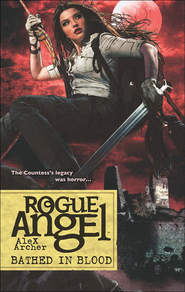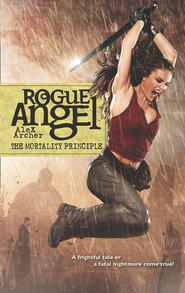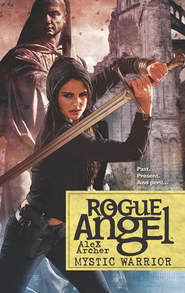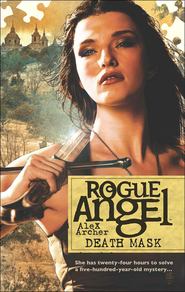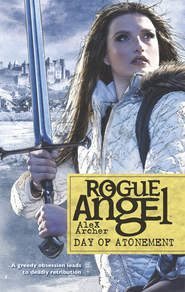По всем вопросам обращайтесь на: info@litportal.ru
(©) 2003-2025.
✖
Grendel's Curse
Автор
Год написания книги
2019
Настройки чтения
Размер шрифта
Высота строк
Поля
“And I’m sure it doesn’t hurt that he looks like Adonis’s only slightly uglier little brother.”
“People will swallow anything a pretty face tells them,” Micke agreed.
Sociopolitical stuff wasn’t Annja’s field of expertise, but they seemed like a reasonable set of assumptions given everything she knew about human behavior.
“Anyway, interesting place for a first date,” she joked, grinning wryly.
“Hey, never let it be said I don’t know how to show a girl a good time,” Micke countered with a grin of his own. It was easy to like him. He had to raise his voice to be heard over the chanting. “Seriously, though,” he said, “Thorssen’s interested in Beowulf. He’s one of the driving forces behind the excavation of the mound. I can think of plenty of reasons why, but rather than just tell you, I thought it’d be better for you to see it firsthand—it’s always more impressive that way.”
Even with him half shouting Annja could barely hear him above the clamor of the audience. The front few rows had long since stopped applauding, she realized. While most of the room was filled with supporters and fanatics, the front three rows consisted of journalists representing the world’s press. She recognized a few faces from Prague, Hyderabad and Paris, but could not put a name to any of them.
“Welcome, my friends,” Thorssen began, his words easy, conversational. Annja was relieved to hear he was going to speak in English; her Swedish was limited to saying “thank you” and she’d only learned that a few hours ago. There was more applause. Thorssen gestured for quiet, and within a few seconds the theater was silent.
He had the crowd in the palm of his hand.
“This is the first day. This is a day of new beginnings. This is the day that we claim back our country. This is the day when the Swedish Tiger roars!” On cue the audience roared its approval.
Thorssen smiled.
Annja didn’t like the man’s smile; it was condescending and self-satisfied. It was the kind of smirk she felt compelled to wipe off a face.
“For too long now we’ve allowed ourselves to be invaded by foreigners...foreigners who have been permitted to stay here, to draw from our state and live in comfort without giving anything back. We allowed them to bring with them their own customs, and have tacitly accepted their beliefs. And if we speak up, anything we say is seen as racist, oppressive, against their freedom. I’m all for freedom, and believe me, my friends, I am no racist. I do not differentiate one man from another by the color of his skin or the God he worships. But the plain unassailable fact is these people do not belong here. We’re a small country. A few years ago we were under ten million, now there are over twelve million people here. We don’t have oil like the Norwegians or the British. We cannot support every asylum seeker who comes here. We’ve been the guilty conscience of the world for too long. Like it or not we have to start thinking about ourselves for once.”
Another round of applause rang out.
Thorssen was preaching to the converted and they were lapping up his sermon.
The huge screen behind him changed to show an aerial view of Skalunda Barrow.
“I am sure some of you recognize this place.” There was a murmur through the hall. Things were about to get interesting. “And even if you don’t, you’ll know the name. This is the Skalunda Barrow, believed to be the final resting place of our greatest hero, the old war wolf himself, Beowulf.” The screen shifted to show twin swords in place of the burial mound: Hrunting, given to Beowulf by Unferth for the fight with Grendel, and Nægling, the magical blade he claimed from Grendel’s cave, having defeated Grendel and Grendel’s mother. “He is a true symbol of our heritage. A warrior. A dragon slayer. He killed the enemies who threatened our land...just as the foreigners threaten it now.” Annja couldn’t quite believe what she’d just heard. Surely it had to be a language thing? A misinterpretation? But the level of sophistication in the rest of Thorssen’s language suggested not. “Now is the time for a new Beowulf to arise! Now is the time for someone to drive the dragons from our land!”
Some of Thorssen’s acolytes seemed to be on the verge of losing themselves in rapture. They were rocking back and forth on their heels, murmuring, “Yes. Yes. Yes.” Only the front few rows seemed to be immune to the craziness. Karl Thorssen was none-to-subtly calling for the people to rise up against immigrants and drive them out of the country.
“Surely this has to be against the law? This is nothing short of inciting racial hated,” Annja said, shaking her head. Her companion didn’t hear her. He was engrossed by the reaction of the crowd, and pointing his cameraman to where he should direct his focus.
Thorssen had adopted the pose again, clearly enjoying the adoration.
She noticed one of the securing men sprang into action, making his way down the side of the stage into the crowd. He’d obviously seen something he didn’t like. Maybe one of the great unwashed wasn’t towing the company line? She scanned the crowd looking for signs of dissent, but everyone seemed to be equally enthralled, waiting for the mothership to beam them up to a racially pure nirvana in the stars.
He pushed his way through the faithful, moving his way toward the back doors.
Curiosity might have killed the cat, but it still hadn’t managed to kill Annja Creed, though not for want of trying. She gave Micke a nod indicating where she was going, but his attention was already elsewhere. He was wrapped up in his own work, making sure the whole thing was captured on camera for his documentary. There was no denying that it would be good television.
Without another word Annja worked her way through the crowd, until she reached the door, and followed the guard out.
The tattooed man didn’t even notice that she was following him.
Once the doors closed behind her Annja should have been isolated from the noise of the auditorium, but she wasn’t. It was replicated by a large flat-screen television and sophisticated sound system broadcasting what was going on inside the theater.
Halfway down the red carpet, the bodyguard caught up with the man he’d spotted in the crowd. Annja was too far away to hear the exchange, but it was obvious from their body language that it was hostile in the extreme. His fingers dug into the guy’s arm as he twisted him around. He said something—the vehemence behind his words translated even if the words didn’t. The man didn’t back down. Far from it, he pushed himself up into the guard’s face and snarled back, feral, spitting full in the middle of his face and cursing him. Annja saw the scar on his cheek. The guard shoved him away and he went stumbling back two steps, reaching out for a handrail to catch his balance before he fell.
The guard grabbed him again.
“Everything all right here?” Annja asked, walking up behind them.
“Keep out of this,” the bodyguard growled. Charming soul. “This has got nothing to do with you.”
Annja wasn’t big on talking with bullyboys, but wasn’t about to leave the man to his not-so-tender mercies. “Look, this doesn’t have to be nasty.”
The man took her intervention as his cue and pulled free of the guard’s grasp, running for the door. The guard didn’t stop him. He was looking at the screen over Annja’s shoulder as the backdrop behind Thorssen changed. The image of the two blades had been replaced by one of a painted Beowulf standing over what was obviously supposed to be Grendel’s mother, the hero holding his sword aloft in victory. It wasn’t subtle. But nothing about Karl Thorssen was.
The camera shifted focus, settling on Thorssen. The politician raised his arm, echoing the image on the screen. It was a carefully choreographed move. He was fully in control, playing the crowd until a sudden explosion of noise erupted—through the doors, from the sound system, from the walls around her. The entire framework of the theater trembled, and then the stones themselves seemed to cry out as the building twisted and buckled.
The cheers mutated into screams.
Suddenly people charged through the doors, desperate to get out of the auditorium. Smoke and rubble filled the air. Nowhere was safe. Not in there. Not out here in the vestibule. She looked for the scar-faced man—the bomber? Was that what had happened here?—but he was gone, swept up with the tide of people and carried away with the stampede as they surged toward the street. Smoke. Sprinklers. Sirens. Chaos. Annja pressed herself against the wall to let the flood of people past; she couldn’t swim against it. Panic drove people from the theater, but not everyone was so lucky. She could see the screen behind the stage with the image of Beowulf battered and bloody in his chain-mail armor, sword aloft, but beneath it, where Grendel’s mother had been, there was only rubble and bodies.
“Micke!” she cried. There was no way he could have heard her but that didn’t stop her calling out his name. She scanned the faces desperately, looking for her friend, not wanting to look toward the bodies for fear of seeing him there.
And then she saw him giving instruction to his cameraman. He was pointing at the stage where Karl Thorssen lay. That was the money shot. In all this devastation, the man who would be one of those angry Norse gods of old lay battered and bleeding as two plainclothed SAPO operatives climbed onto the stage, trying to find a path through the rubble to get to the politician. It was an iconic moment. It would be shown on every television set in the world. It would be talked about for weeks. Thorssen rose from the ashes shakily, bruised and bloodied, like the heroic figure on the screen behind him. He breathed in deeply, savoring life amid all of this destruction, and turned to look directly at the camera.
“I am Beowulf,” he declared.
2
It was a long night and a longer morning.
She stayed with the rescuers, helping the weak and wounded. Annja pulled at the broken stones, heaving them aside. She heard cries all around her. She couldn’t stop. She couldn’t allow the horror of the moment to really take root in her mind. Right now people needed her.
Chaos quickly gave way to at least the semblance of order as the paramedics and firemen worked, directing the rescue efforts. To her left three men labored hard, lifting a huge slab of masonry off the legs of a man who wouldn’t be walking again for a very long time, if ever. Shock rendered him silent. The rescue workers talked to him constantly, telling him how well he was doing, telling him to hang in there, telling him to be strong, that he was almost out, but not once telling him that everything would be all right. There was a reason for that. The woman beside him was beyond help. He clung to her hand. He must have known.
Annja moved on to where she could be of more use.
A medic crouched over a man who’s silver hammer on a chain had torn open his throat, giving him a crude tracheotomy.
She recognized Micke’s cameraman. He stood aloof from the destruction, taking it all in with his lens as though the camera gave him the right to separate himself from the dead and the dying, to simply watch and record the tragedy rather than be a part of it. She wondered how he could stand there and do nothing, but she didn’t wonder for very long. He was coping with it the only way he knew how: documenting it. There was no telling what his camera might pick up that they would miss because they were too wrapped up in the immediacy of the moment, unable and unwilling to just take a step back and look.
The worst of it, though, was the smell—that slaughterhouse mix of burned meat and fecal matter that came with death.
So she lost herself in the simple act of trying to help.
Annja was among the last to leave the theater, covered in plaster dust and blood. She must have looked like a ghost emerging from the darkness into the bright sunlight. It could just as easily have been midafternoon as dawn; the sky was blue, without a cloud, the air so fresh in her lungs it stung. They were supposed to be breaking ground in Skalunda in a few hours. There’d be no beauty sleep today.
A stone-jawed policeman came across and started talking to her in rapid-fire Swedish. She didn’t understand a word and just shrugged. “I’m sorry. American?”
He switched to flawless English. “Before you go, we need your contact details so we can be in touch to take a statement.”
“Of course,” Annja said. “I’m staying in a hotel downtown.” She pointed toward the hulking shape of her hotel towering over the skyline. It was impossible to miss.






